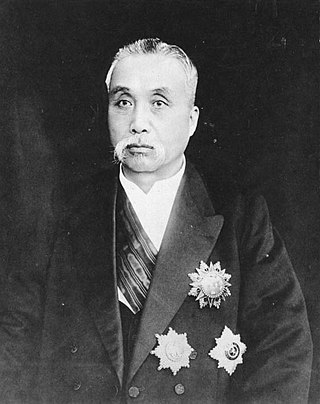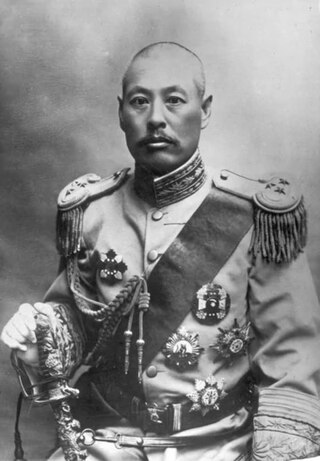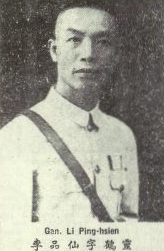This article needs additional citations for verification .(February 2024) |
| |||||
| Decades: | |||||
|---|---|---|---|---|---|
| See also: | Other events of 1880 History of China • Timeline • Years | ||||
A list of historical events that took place in China in the year 1880.
This article needs additional citations for verification .(February 2024) |
| |||||
| Decades: | |||||
|---|---|---|---|---|---|
| See also: | Other events of 1880 History of China • Timeline • Years | ||||
A list of historical events that took place in China in the year 1880.

Xu Shichang was a Chinese politician who served as the President of the Republic of China, in Beijing, from 10 October 1918 to 2 June 1922. The only permanent president of the Beiyang government to be a civilian, his presidency was also the longest of the Warlord Era. Previously, he was Minister of the Cabinet of the Imperial Cabinet during the Qing Dynasty.

The Beiyang Army, named after the Beiyang region, was a large, Western-style Imperial Chinese Army established by the Qing dynasty government in the late 19th century. It was the centerpiece of a general reconstruction of Qing China's military system. The Beiyang Army played a major role in Chinese politics for at least three decades and arguably right up to 1949. It made the Xinhai Revolution of 1911 possible, and, by dividing into warlord factions known as the Beiyang Clique, ushered in a period of regional division.

Wan Li was a Chinese Communist revolutionary and politician. During a long administrative career in the People's Republic of China, he served successively as Vice Premier, Chairman of the Standing Committee of the National People's Congress (NPC), and a member of the Chinese Communist Party (CCP) Secretariat and its Politburo. Wan joined the Chinese Communist Party in 1936 and led revolutionary and wartime resistance activities in his native Shandong province. After the founding of the communist state in 1949, Wan served in a series of government ministries, then worked as a member of the municipal leadership in Beijing. He was purged during the Cultural Revolution, but was eventually rehabilitated and returned to work as party chief of Anhui province, where he led the implementation of successful agrarian reforms centered on the household-responsibility system. In the 1980s, Wan became one of the leading moderate reformers in China's top leadership, advocating for constitutional reforms, the strengthening of legislative institutions, and the abolition of 'lifelong-terms' of top political leaders. He was named head of the national legislature in 1988. He retired in 1993.

Wu Peifu was a Chinese warlord and major figure in the Warlord Era in China from 1916 to 1927.

Hsu Seu-Cheng or Xu Shuzheng was a Chinese warlord in Republican China. A subordinate and right-hand man of Duan Qirui, he was a prominent member of the Anhui clique.

The Warlord Era was a period in the history of the Republic of China when control of the country was divided among former military cliques of the Beiyang Army and other regional factions from 1916 to 1928.

The Beiyang government was the internationally recognized government of the Republic of China between 1912 and 1928, based in Beijing. It was dominated by the generals of the Beiyang Army, giving it its name.
The Anhui clique was a military and political organization, one of several mutually hostile cliques or factions that split from the Beiyang clique in the Republic of China's Warlord Era. It was named after Anhui province because several of its generals–including its founder, Duan Qirui–were born in Anhui.
The Constitutional Protection Movement was a series of movements led by Sun Yat-sen to resist the Beiyang government between 1917 and 1922, in which Sun established another government in Guangzhou as a result. It was known as the Third Revolution by the Kuomintang. The constitution that it intended to protect was the Provisional Constitution of the Republic of China. The first movement lasted from 1917 to 1920; the second from 1921 to 1922. An attempted third movement, begun in 1923, ultimately became the genesis for the Northern Expedition in 1926.

Wan Fulin was the military governor of Heilongjiang province from 1928 and part of the Fengtian clique. On December 29, 1928, he along with Zhang Xueliang, son of the late Zhang Zuolin, together with Zhang Zuoxiang fought against Japanese threats and coercion declared in a public wire that the four provinces of Fengtian (Liaoning), Jilin, Heilongjiang and Rehe would change the flag to that of the Republic of China and obey the National Government.

Li Pinxian was a Republic of China Army general from Cangwu County, Guangxi. His career spanned the Xinhai Revolution, Warlord Era, the Second-Sino Japanese War, and the Chinese Civil War. After the loss of the mainland to the Chinese Communist Party in 1949, he left for Taiwan.

Wang Yitang was a politician and military leader in the Qing Dynasty and Republic of China. He belonged to the Anhui clique and formed the Anfu Club (安福俱樂部). Later he became an important politician in the Provisional Government of the Republic of China and the Reorganized National Government of the Republic of China. His former name was Zhiyang (志洋) and his courtesy names were Shenwu (慎吾) and Shengong (什公). Later, his name was changed to Geng (賡) while his courtesy name was changed to Yitang (一堂). He was also known by his art name Yitang (揖唐). He was born in Hefei, Anhui.

He Peirong was a military personnel and politician in the Republic of China. He belonged to the Beijing Government, Anhui clique. In the end, he was an important politician during the Reformed Government of the Republic of China and the Wang Jingwei regime. His courtesy name was Yunshan (韵珊). He was born in Jianshi, Hubei.

He Fenglin was a Chinese general and warlord. He belonged to the Anhui clique and the Fengtian clique, and later served as the Minister of War of the Republic of China.
Events in the year 1949 in China.
Events in the year 1960 in the People's Republic of China.

Duan Qirui was a Chinese warlord, politician and commander of the Beiyang Army who ruled as the effective dictator of northern China in the late 1910s. He was the Premier of the Republic of China on four occasions between 1913 and 1918, and from 1924 to 1926 he served as acting Chief Executive of the Republic of China in Beijing.

Jia Deyao was a Chinese military commander and politician, member of the Anhui clique during the Beiyang Government.
Wan is the Mandarin pinyin and Wade–Giles romanization of the Chinese surname written 万 in simplified Chinese and 萬 in traditional Chinese. It is romanized as Man in Cantonese. It is listed 162nd in the Song dynasty classic text Hundred Family Surnames. As of 2008, it is the 88th most common surname in China, shared by 2.4 million people. The province with the most people having the surname is Anhui. In 2011, of the top 30 cities in China it was the only the top ten surnames of Nanchang, where it is the fourth-most common name.

Qi Xieyuan, born Qi Ying, with a courtesy name of Qi Fuwan and the art name of Yaoshan, was a general of the military of the Republic of China and a warlord of the Zhili clique. He defected to the Japanese after the creation of the Provisional Government of the Republic of China, later participating in the North China Political Council, its successor.